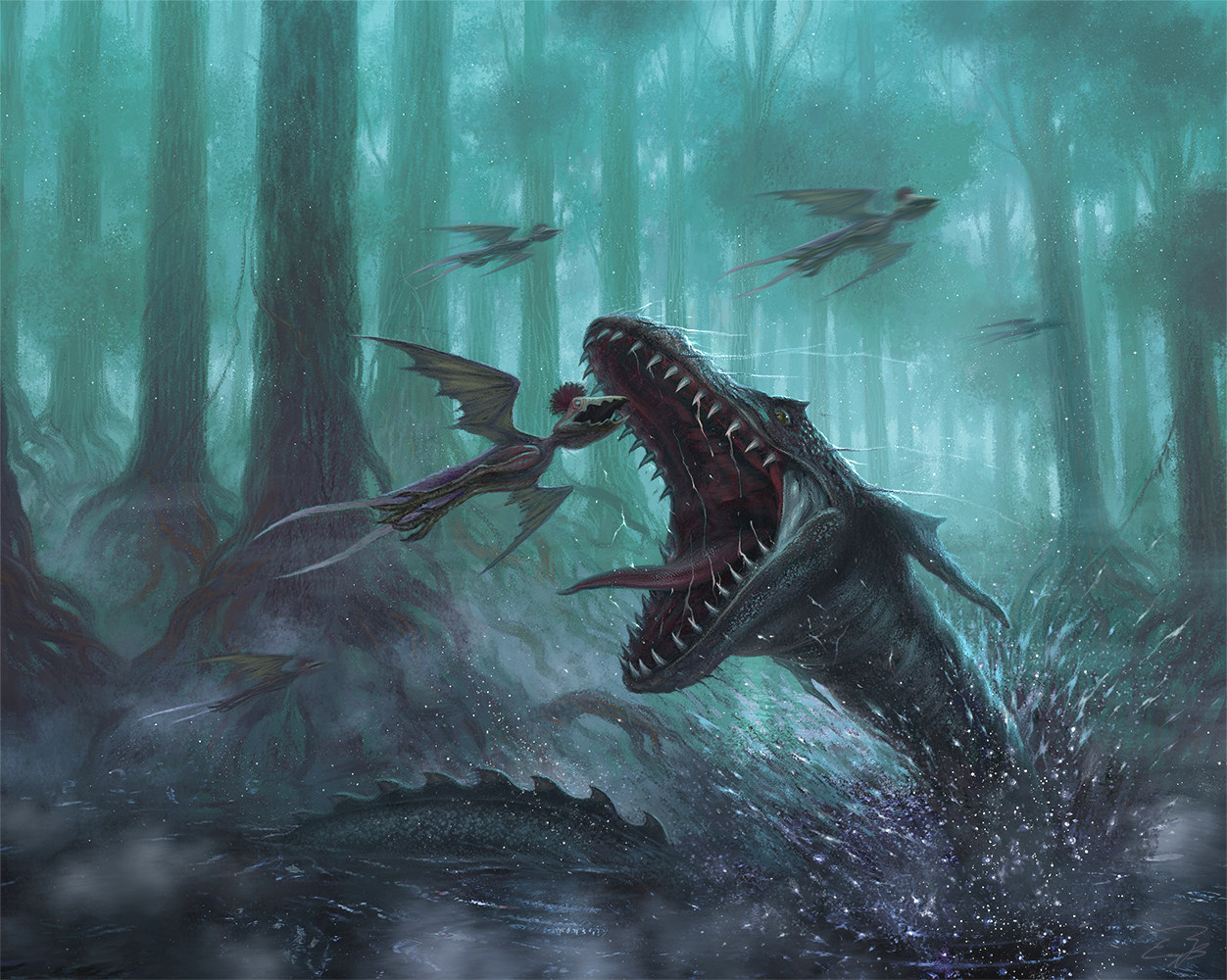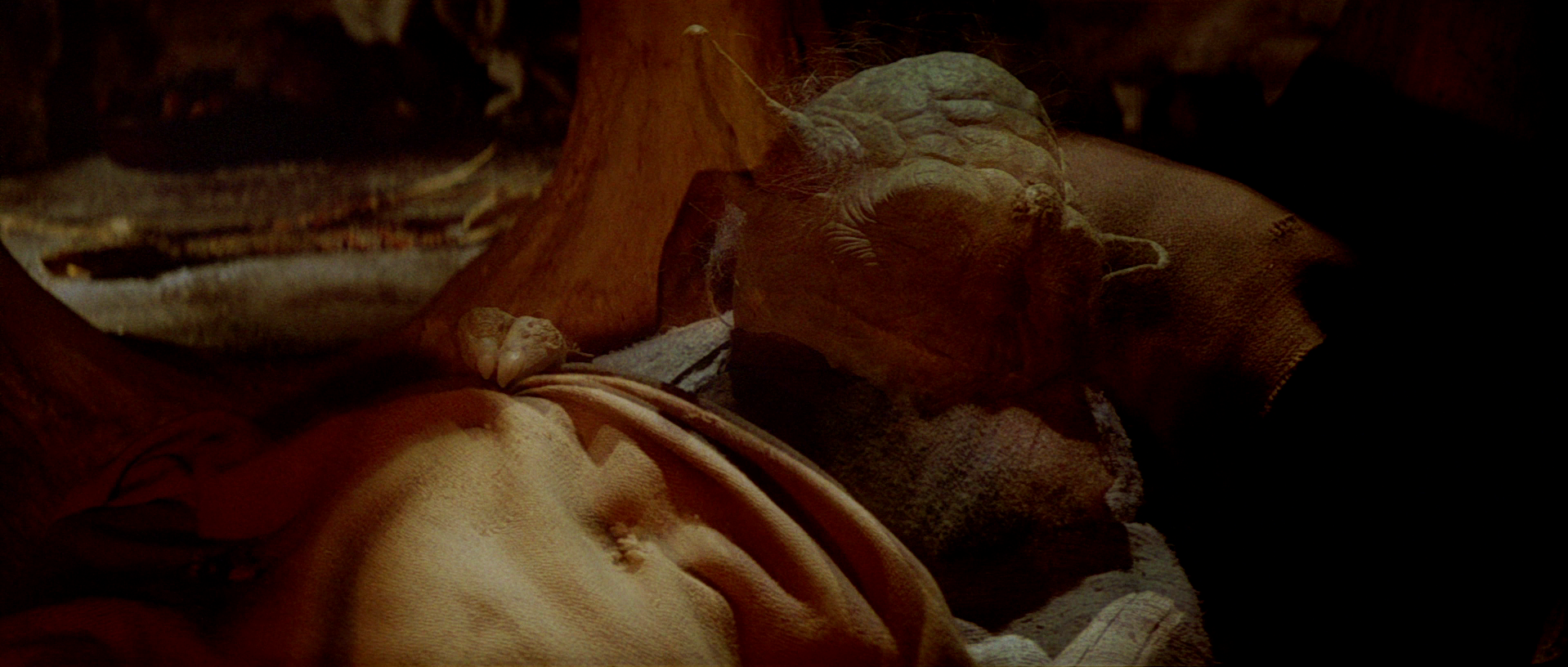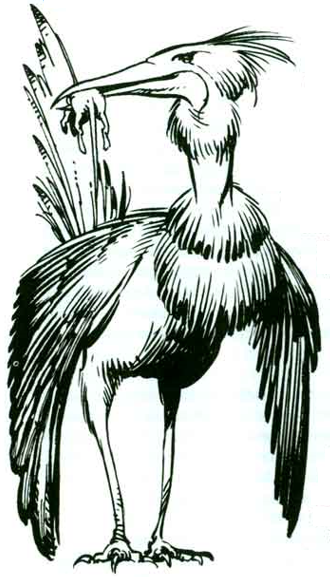During the Galactic Civil War, a handful of smugglers captured jubba birds from the canopies of Dagobah, as the birds' soothing songs were prized throughout the galaxy. Jubba birds sang to the Jedi Yoda while he lived in exile on Dagobah, and when he died in 4 ABY they huddled in fear due to the dark presence that was no longer suppressed by the Jedi.
Jubba birds were a species of non-sentient bird with two yellow eyes, a puffy brown or red crest, and skin that ranged from purple-and-red to purple-and-brown in coloration. They featured two yellow wings, a lengthy purple tail with two widely separated ends, and a pair of spindly brown legs ending in three-clawed feet. They had a wide yellow beak with serrated edges on both mandibles and two nostrils located on the upper mandible.
Jubba birds were native to the swamplands of the planet Dagobah, where they used mud scooped from Dragonsnake Bog to make heavy nests that weighed down the trees in which they were built. As natural Force-users, the birds were known for their soothing songs, which reached beyond simple melodies and could calm creatures and beings through subtle manipulation of the Force. Manipulating other creatures in this way helped the birds avoid becoming prey, as did the fact that they used it to quiet their young when danger neared. Jubba birds flew low enough above Dagobah's swamps to be within range of a dragonsnake rearing up from under the surface of the water to try and catch the bird in its jaws.

A dragonsnake attacks a jubba bird.
A handful of smugglers were among the only individuals who knew of Dagobah during the Galactic Civil War, and they occasionally traveled to the planet in order to capture jubba birds, which were prized throughout the galaxy for their songs.
Due to the dangers on Dagobah's surface, the smugglers never landed on the planet, instead snatching jubba birds from the upper section of the jungle canopy in their starships before leaving. Even with these precautions, leaf-tails still sometimes managed to cause near-catastrophic damage to the smugglers' ships by tearing out wiring.

Jubba birds were impacted by the death of Yoda.
During his exile on Dagobah, the Jedi Yoda did not fear the wildlife and jubba birds were drawn to sing to him by means that the dragonsnake he named Bright-Eyes could not understand. On the night that Yoda died in his home on Dagobah in 4 ABY, an unusual quiet fell over the swamps nearby as a dark presence that Yoda had been suppressing was unleashed.
The jubba birds huddled silently in the highest branches of the gnarltrees, too afraid to sing, which Bright-Eyes noticed, as it kept them out of her reach. Although not as sensitive to what was happening as the jubba birds, Bright-Eyes also felt the darkness spreading over Dagobah.

Tim Eldred's original jubba bird design
Jubba birds were first mentioned in the new Star Wars canon in the 2015 reissue of Journey Through Space, a young-readers book written by Ryder Windham. They were later pictured in the 2016 canon reference book Star Wars: Galactic Atlas, which was illustrated by Tim McDonagh. Jubba birds then first appeared in "The Light That Falls," a short story written by Akemi Dawn Bowman and published in the 2003 anthology From a Certain Point of View: Return of the Jedi.
The species was originally created for "Glah Ubooki's Strange & Wondrous Imports," a Star Wars Legends article written by Shane Hensley and published in the February 1994 first issue of the Star Wars Adventure Journal magazine series. The article included an image of a jubba bird by Tim Eldred that depicted the creatures as long-legged and feathery; however, the creatures' look was re-designed by artist Terryl Whitlatch in the 2001 reference book The Wildlife of Star Wars: A Field Guide and it was Whitlatch's version that was carried over to canon.
- Journey Through Space
- Nexus of Power
- Star Wars: Complete Locations
- Star Wars: Galactic Atlas
- Star Wars: The Card Game — Scrap Metal